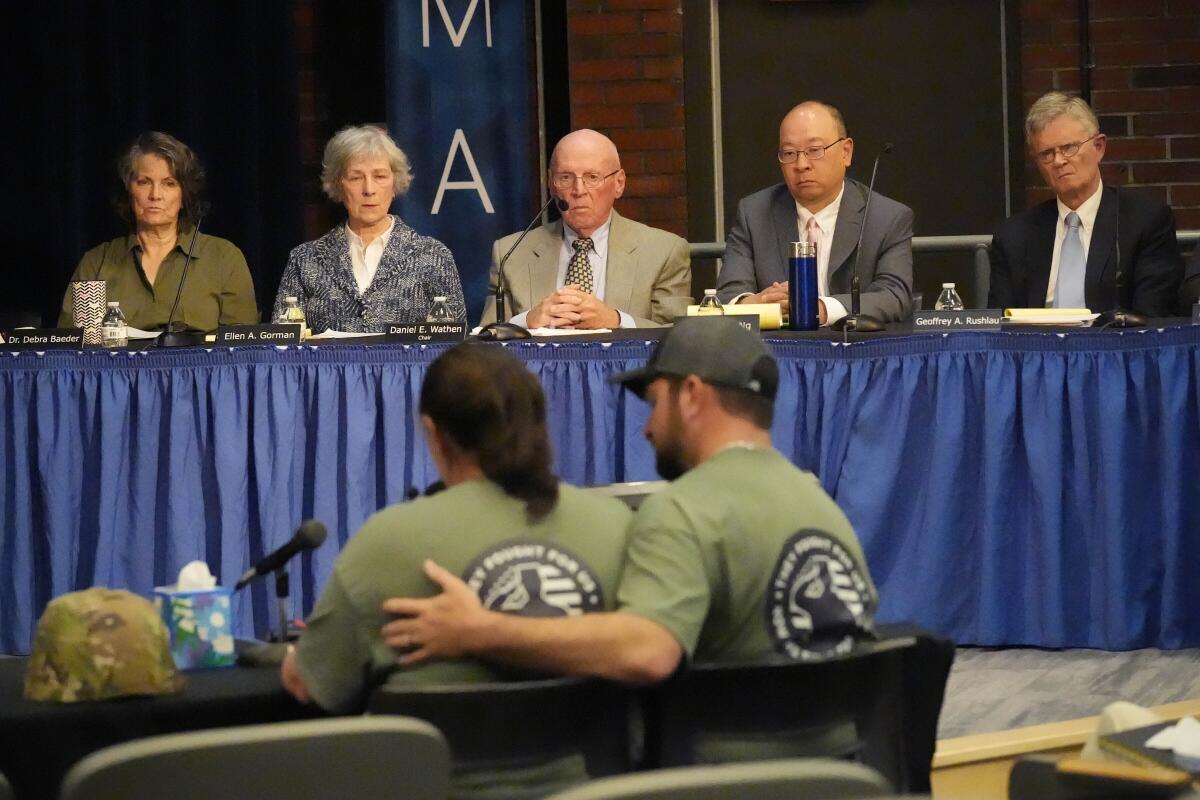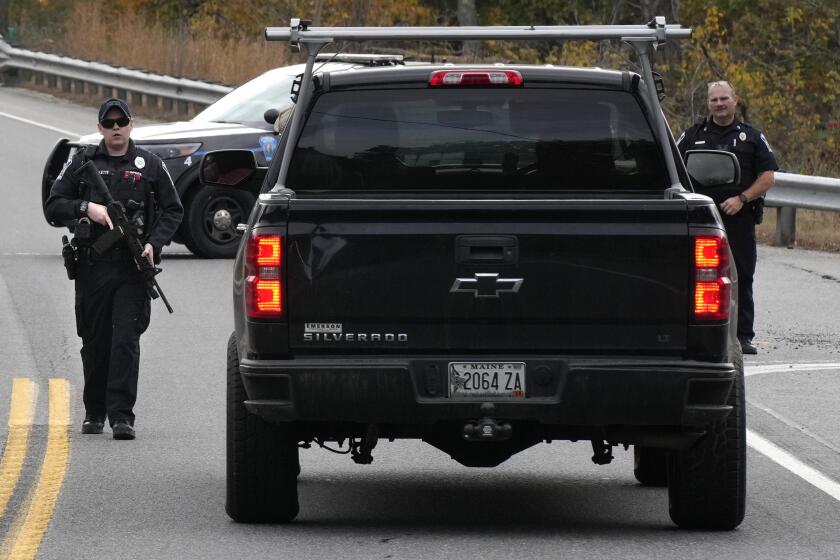Army and police missed chances to intervene before Maine mass shootings, final report says

- Share via
LEWISTON, Maine — Both the Army Reserve and local police missed out on opportunities to intervene in a gunman’s psychiatric crisis and seize weapons from the spiraling reservist responsible for the deadliest shootings in Maine history, according to the final report released Tuesday by a special commission created to investigate the attacks, which killed 18 people.
The independent commission, which held more than a dozen public meetings, heard from scores of witnesses and reviewed thousands of pages of evidence, cited shortcomings by police for failing to take the gunman’s weapons and by the Army Reserve for failing to provide proper care for the 40-year-old gunman, Robert Card.
The commission, created by Democratic Gov. Janet Mills, announced its conclusions at Lewiston City Hall, less than three miles from the two sites where the shootings took place Oct. 25, 2023.
The 215-page report reiterated the panel’s conclusion from an interim finding in March that law enforcement had authority under the state’s yellow flag law to seize the shooter’s guns and put him in protective custody weeks before the shootings. But it also said the Army Reserve should have done more to ensure care and deal with the weapons.
The Girl Scouts in this troop, in one of New York’s emergency migrant shelters, know hardship and loss. But at meetings at least, they get to be kids.
Daniel Wathen, chair of the commission, started his remarks by acknowledging the victims. “None of us can begin to imagine the pain you people have experienced on that terrible day,” he said.
He said it’s impossible know if the tragedy would have happened if police and the Army had done a better job. He also said police did their best to respond to the tragedy but noted that there was “utter chaos” when hundreds of police officers poured into the region.
Wathen defended the commission’s decision to avoid making recommendations, which he said were outside of its fact-finding mission. It’s up to others, he said, to implement changes based on the report. ”We hope that we have done a service to everyone by setting forth those facts,” he said.
Authorities say 18 people were killed and 13 injured at two locations Wednesday night in Lewiston, the second-largest city in Maine.
Ben Gideon, a lawyer for survivors and relatives of those who died, described the shooting as a dangerous intersection of gun ownership and mental illness.
“At the end of the day, what happened here was a pairing of someone who was known to be paranoid, delusional and suffering from a diagnosed psychosis with someone who owned numerous weapons of warfare, including six semiautomatic assault weapons,” he told reporters.
The commission began its work a month after the mass shooting by Card, an Army reservist who killed 18 people at a bowling alley and a bar in Lewiston and then took his own life. Over nine months, there has been emotional testimony from family members and survivors of the shooting, law enforcement officials and U.S. Army Reserve personnel, and others.
The commission’s public hearings revealed the swift response by police to the shootings, but also the ensuing chaos during the search for the gunman. Card’s sister testified at a hearing, her hand resting on his military helmet as she spoke. Kathleen Walker, whose husband, Jason, was killed while rushing at Card to try to stop him, said: “The system failed, and we can’t allow this to happen again.”
Family members and fellow reservists said Card had exhibited delusional and paranoid behavior months before the shootings. He was hospitalized by the Army during training in July 2023, but a commanding officer acknowledged to the commission that he didn’t check on Card’s compliance on follow-up care.
The starkest warning came in September when a fellow reservist texted an Army supervisor, saying, “I believe he’s going to snap and do a mass shooting.” Card killed himself after the shootings and search.
Army officials conducted their own investigation after the shootings that Lt. Gen. Jody Daniels, then the chief of the Army Reserve, said found “a series of failures by unit leadership.” Three Army Reserve leaders were disciplined for dereliction of duty, according to the report, which noted communication failures within the chain of command and between military and civilian hospitals.
Maine’s legislature passed new guns laws for the state, which has a tradition of hunting and firearms ownership, after the shootings. A three-day waiting period for gun purchases went into effect this month.
Associated Press writer Whittle reported from Lewiston, Sharp from Portland, Maine.
More to Read
Sign up for Essential California
The most important California stories and recommendations in your inbox every morning.
You may occasionally receive promotional content from the Los Angeles Times.












